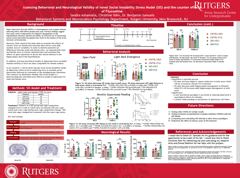Ashamalla, Sandra: Assessing Behavioral and Neurological Validity of Novel Social Instability Stress Model (SIS) and the Counter Effects of Fluoxetine
Title: Assessing Behavioral and Neurological Validity of Novel Social Instability Stress Model (SIS) and the Counter Effects of Fluoxetine
Name: Sandra Ashamalla
Major: Cell Biology and Neuroscience/ Psychology
School affiliation: School of Arts and Sciences
Programs: Aresty – Research or Conference Funding Recipient
Other contributors: Dr. Benjamin Samuels
Abstract: Despite stress-associated disorders having a higher incidence rate in females, preclinical research on stress and anxiety have been mainly focused on males. Additionally, chronic stress paradigms, such as chronic social defeat, chronic corticosterone administration, and unpredictable mild chronic stress, were mainly designed and validated in males with subsequent attempts to use these paradigms in females demonstrating sex differences in the behavioral and HPA axis response to stress. Therefore, we aimed to create a novel stress model that is both pharmacological and behaviourally valid in both sexes. Here, we developed a social stress paradigm, social instability stress (SIS), which exposes adult mice to unstable social hierarchies for 7 weeks. Mice in the SIS treatment group were subject to new cage mates and new cages twice a week in the 7 week span while control (CNRL) groups experienced cage changes but remained with the same cage mates. We found that SIS effectively induces negative valence behaviors and hypothalamus-pituitary-adrenal (HPA) axis activation in both males and females. Importantly, while there were effects of estrous cycle on behavior, this variability did not impact the overall effects of SIS on behavior, suggesting estrous does not need to be tracked while utilizing SIS. Furthermore, the effects of SIS on negative valence behaviors were also reversed following chronic antidepressant treatment with fluoxetine (FLX) in both males and females. SIS also reduced adult hippocampal neurogenesis in female mice, while chronic FLX treatment increased adult hippocampal neurogenesis in both males and females. Overall, these data demonstrate that the SIS paradigm is an ethologically valid approach that effectively induces chronic stress in both adult male and adult female mice.
